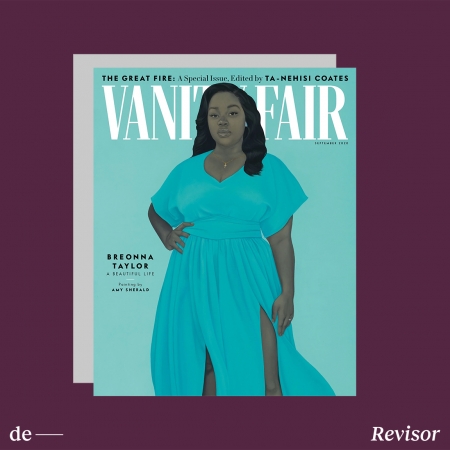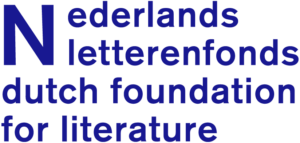Deze week gelezen: Vanity Fair
Ta-Nehisi Coates, Jesmyn Ward en anderen in Vanity Fair: de redacteur las de uiterst actuele’The Great Fire’-editie van het Britse tijdschrift onder gastredactie van Ta-Nehisi Coates.
*
Daan Stoffelsen: Ta-Nehisi Coates, Jesmyn Ward en anderen in Vanity Fair
Deze week werd bekendgemaakt dat de agenten die Breonna Taylor in de nacht van 13 maart dit jaar doodden, niet vervolgd worden voor moord. Een van de drie wordt voor andere aanklachten vervolgd, twee gaan vrijuit. Toen de politie die 13de maart een inval deed in haar huis, en haar verloofde een waarschuwingsschot loste, schoten de agenten ook. Taylor werd door zes kogels getroffen – een werd haar fataal.
Ik schrijf dat hier allemaal uit omdat Taylor op de cover van de Vanity Fair staat. Ta-Nehisi Coates, de auteur van indringende essays en boeken over racisme in de Verenigde Staten, is er de gastredacteur van. Hij liet Taylor schilderen op basis van foto’s, en interviewde haar moeder. Hij koos met uitsluitend zwarte journalisten voor een ander perspectief op de dood van George Floyd en de coronacrisis. En hij publiceerde dus Jesmyn Wards essay over haar overleden geliefde.
Het nummer heet ‘The Great Fire’, geïnspireerd door poëzie van Eve L. Ewing en de overtuiging onder witte bewoners van Chicago dat ‘the first Great Migration to the city was “the worst calamity that had struck the city since the Great Fire” of 1871’. Die ramp, die Lex ter Braak bespreekt in ons najaarsnummer ‘Meer lucht’, kostte honderden het leven. Maar de vergelijking heeft, benadrukt Coates in zijn Redactioneel, dramatische gevolgen. Het is een dehumanisering van zwarte mensen, ze verworden tot een omstandigheid, iets wat je overkomt, en wat je moet bestrijden. Individuen worden samengenomen als een groep, een golf, een plaag, met de bijbehorende negatieve terminologie.
Wat te doen? ‘It is an impressive thing, this Great Fire, but it is not omnipotent. It is endangered not just by corporate co-option, but by those who venerate “the art of the possible” like an 11th commandment. Even now it is said that only on November 3 will we truly know how bright the Fire burns. “Don’t boo. Vote,” we are told, when in reality we should do both.’ Protesteren én stemmen. En een derde ding, en dat onderstrepen de bijdragen aan het tijdschrift: individualiseren. Van strafzaken mensen maken, hun angsten, overtuigingen en hoop uitspellen. Breonna’s vriend had al een verlovingsring gekocht, hij is ermee gefotografeerd voor het magazine.
Er staat een ijzingwekkende anekdote in zijn interview met Tamika Palmer, Taylors moeder, die Coates expres niet laat laat samengaan met wat we inmiddels weten: de politie doodde Taylor. Palmer, gealarmeerd door haar schoonzoon, komt naar de crime scene, maar mag niet bij haar dochter. Wordt niets verteld over haar dochter. Een agent stelt zich voor. ‘I don’t remember what his name actually is, but he kind of just goes on to ask me if I knew anybody who would want to hurt Breonna, or Kenny, or if I thought they were involved in anything.’
Pas pagina’s verder, na een liefdevolle geschiedenis van Palmers leven en dat van Taylor, schrijft Coates:
‘Now I’m confused. Because you asked me whether I knew someone who wanted to hurt my daughter. But you did it. Why couldn’t you have just told me that the police did this?’
De hypocrisie. De onrechtvaardigheid.
Twee weken geleden wees Jan Postma mij (en al zijn volgers op Twitter) in ernst op Jesmyn Wards essay in dit nummer. Kort daarop schreef ook Jann Ruyters in Trouw erover. Ward, bekroond met de National Book Award voor haar roman Het lied van de geesten, heeft begin dit jaar haar man verloren. De beschrijving van zijn ziekteproces is even herkenbaar als tragisch. Ik citeer ruim:
‘In early January, we became ill with what we thought was flu. Five days into our illness, we went to a local urgent care center, where the doctor swabbed us and listened to our chests. The kids and I were diagnosed with flu; my Beloved’s test was inconclusive. At home, I doled out medicine to all of us: Tamiflu and Promethazine. My children and I immediately began to feel better, but my Beloved did not. He burned with fever. He slept and woke to complain that he thought the medicine wasn’t working, that he was in pain. And then he took more medicine and slept again.
Two days after our family doctor visit, I walked into my son’s room where my Beloved lay, and he panted: Can’t. Breathe. I brought him to the emergency room, where after an hour in the waiting room, he was sedated and put on a ventilator. His organs failed: first his kidneys, then his liver. He had a massive infection in his lungs, developed sepsis, and in the end, his great strong heart could no longer support a body that had turned on him. He coded eight times. I witnessed the doctors perform CPR and bring him back four. Within 15 hours of walking into the emergency room of that hospital, he was dead. The official reason: acute respiratory distress syndrome. He was 33 years old.
Without his hold to drape around my shoulders, to shore me up, I sank into hot, wordless grief.
Is er al een vertaling van dit stuk? Het kan zo in De Groene Amsterdammer of Trouw, een literair tijdschrift als het onze is wat trager, maar je denkt: koorts, ademhalingsproblemen, beademing, corona! En dan: maar dat kan nog niet in januari in de Verenigde Staten! En dan stel je vast: het is zowel gedetailleerd als compact, nu weer procesmatig beschrijvend, dan weer met een pijnlijke vaststelling: ‘Hij was 33.’ ‘Ik zonk weg in hete, woordeloze rouw.’
(Of moet je daarin meer nadruk leggen, op de jaren, en die korte zin letterlijker vertalen? En is ‘his hold to drape around my shoulders’ poëtisch, onnatuurlijk Engels, dat je moet vertalen met ‘zijn houvast om me te omarmen’ of iets dergelijks?)
Verdriet. Het coronavirus. ‘They clung to me, rubbed their faces into my stomach, and cried hysterically: I miss Daddy, they said. Their hair grew tangled and dense. I didn’t eat, except when I did, and then it was tortillas, queso, and tequila.’ En dan, in één lange zin:
‘During the pandemic, I couldn’t bring myself to leave the house, terrified I would find myself standing in the doorway of an ICU room, watching the doctors press their whole weight on the chest of my mother, my sisters, my children, terrified of the lurch of their feet, the lurch that accompanies each press that restarts the heart, the jerk of their pale, tender soles, terrified of the frantic prayer without intention that keens through the mind, the prayer for life that one says in the doorway, the prayer I never want to say again, the prayer that dissolves midair when the hush-click-hush-click of the ventilator drowns it, terrified of the terrible commitment at the heart of me that reasons that if the person I love has to endure this, then the least I can do is stand there, the least I can do is witness, the least I can do is tell them over and over again, aloud, I love you. We love you. We ain’t going nowhere.’
Het gebed dat ergens in de lucht oplost in de vloed van de stil-klik-stil-klik van de beademing.
De samenloop van de coronacrisis en de opleving van de protesten tegen racisme benadrukt dezelfde ongelijkheden, en niet voor niets wijdt ook De Revisor een themanummer aan de pandemie en de beweging, maar Ward verbindt ze heel natuurlijk. Rouw verbindt de familieleden van Ward met die van Taylor en die van de slachtoffers van Covid-19. Ervan getuigen is wat we moeten, en spreken van die liefde, dat ook. Lees het stuk, online of in het tijdschrift, want dit is journalistiek die ondersteund moet worden.



